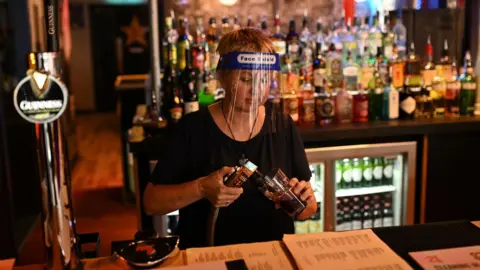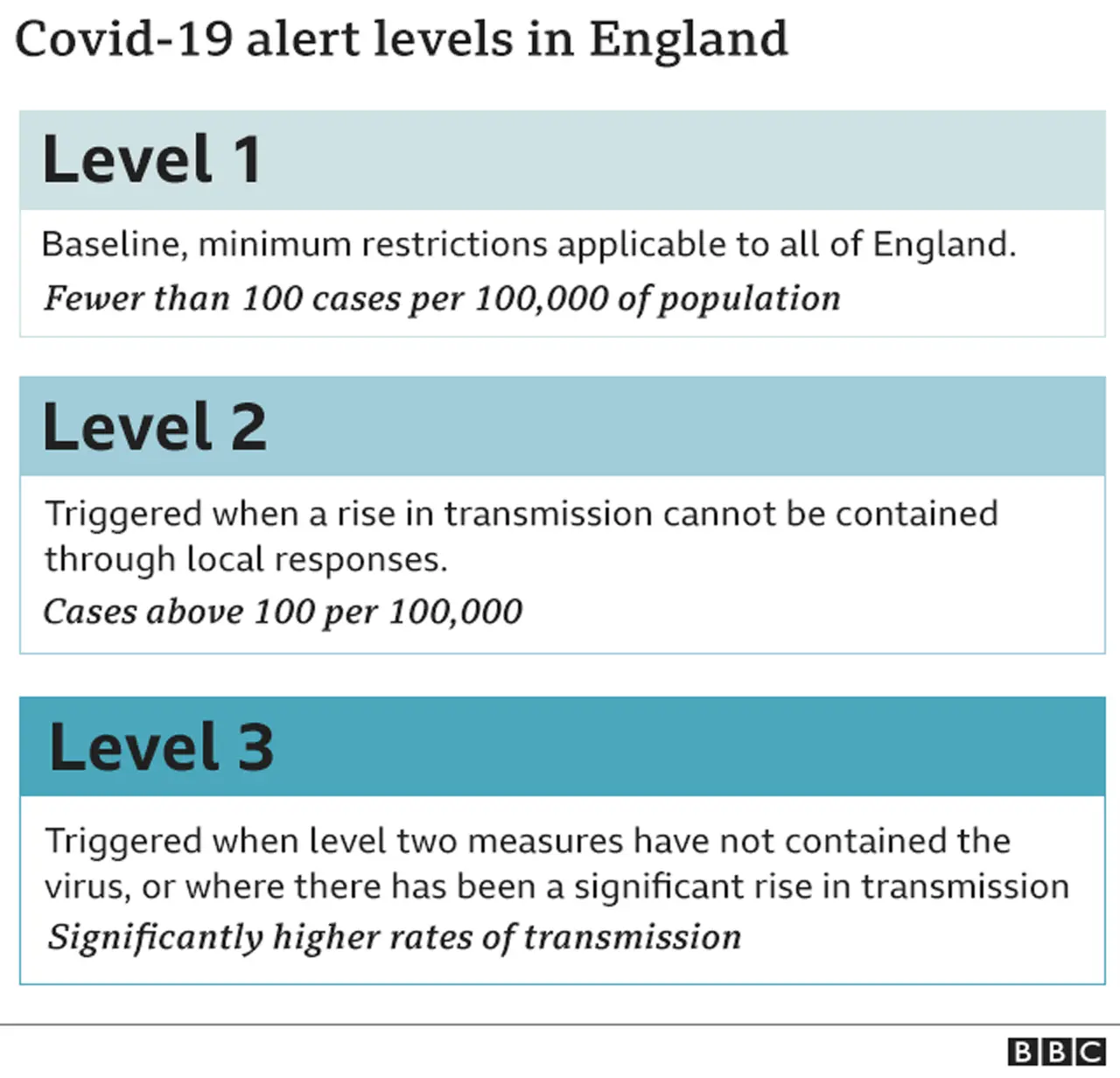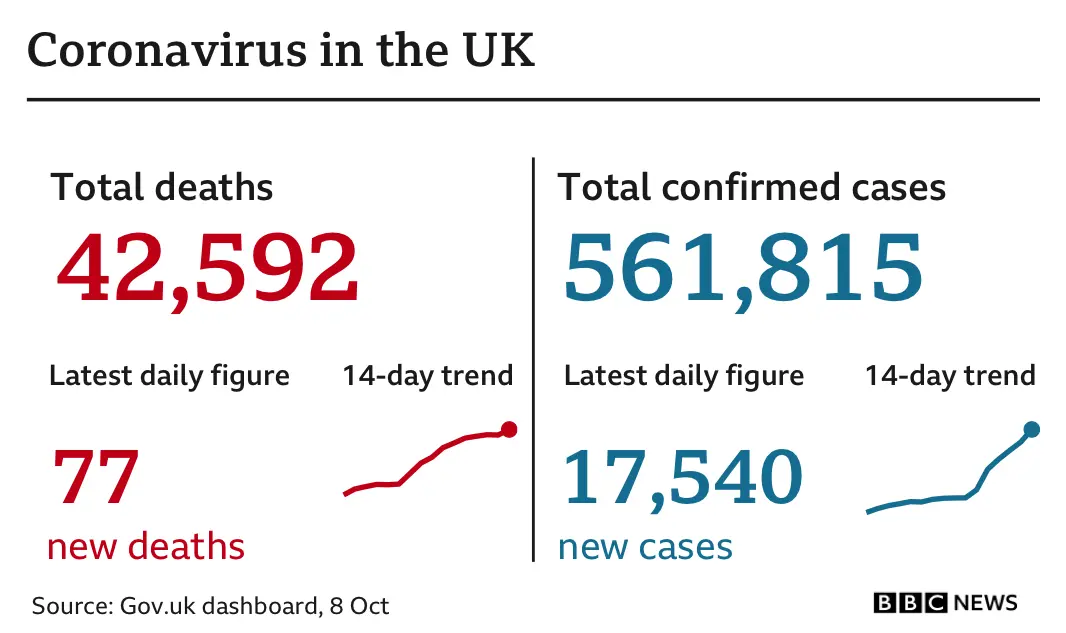Covid-19: New restrictions to be announced for parts of England 'within days' - Jenrick
 Getty Images
Getty ImagesNew measures to tackle coronavirus are to be announced "in the coming days", a minister says, after the BBC was told pubs and restaurants could be closed in the worst-affected areas of England.
There could also be a ban on overnight stays away from home in the locations - which include the North and Midlands.
Communities Secretary Robert Jenrick said the government was "currently considering what steps to take".
A three-tier system for local lockdowns is also likely to be announced.
Under the system, different parts of the country would be placed in different categories - although ministers are still discussing the precise details of the toughest level of restrictions over the next couple of days.
A final decision on the time period or extent of potential closures has not yet been made and a formal announcement is not likely to come until Monday, BBC political editor Laura Kuenssberg said.
It comes as North of England and Midlands MPs have been briefed by health ministers and chief medical officer Chris Whitty about the latest coronavirus data.
The number of people in the UK to have tested positive for coronavirus rose by 17,540 - an increase of 3,378 on Wednesday's figures - with a further 77 deaths reported.
Some politicians in the North of England and the Midlands have shared their frustration about the plans appearing in newspapers before being announced in Parliament.
The Labour mayor of Greater Manchester, Andy Burnham, told the BBC: "If it's urgent, give us the detail, give us the evidence behind the proposals. Let's discuss it and let's agree it quickly."
Meanwhile, Labour has challenged the government to publish the scientific evidence behind the 22:00 BST closing time for pubs and restaurants in England.
Leader Sir Keir Starmer said his party would not be "voting down" the measure in the Commons next Tuesday but the policy "needs to be reformed".

Downing Street said that early data suggested a "significant proportion" of coronavirus exposure was seen in the hospitality sector, especially in younger age groups.
But pressed on whether the government would publish evidence on the issue, Mr Jenrick told the BBC: "It is commonsensical that the longer you stay in pubs and restaurants, the more likely you are to come into contact with other individuals.
"The more drinks that people have, the more likely that some people are to break the rules."
He added that it was right to "take action decisively, rather than waiting for the most detailed epidemiological evidence to emerge".
On the possibility of additional restrictions for some parts of England, Mr Jenrick did not rule out pubs being closed but said the response would be "proportionate and localised".
He added the government was trying to give "greater consistency on rules so they're easier to understand" and was working on "slightly broader canvases of regions or cities and counties to avoid differences in people's daily lives if they drive over the border".


It's a complicated equation. The Department of Health is worried about the spread of the disease, as well as other patients losing out on other treatments because of the focus on Covid.
No 11 is fearful about the impact on the economy, which has already had a profound shock.
And it's No 10's job to worry about all of it, then reach a conclusion.
But Boris Johnson also knows that his own MPs and the opposition parties are more and more sceptical as each day passes about what the government proposes.
It's clear that shutting pubs and restaurants is a possibility - the "circuit breaker" that we have talked about lots of times.
But there are many questions still to be settled.

The planned tightening of restrictions in parts of England follows rising infection rates across much of the country, with the Academy of Medical Colleges warning the NHS is at risk of becoming overwhelmed.
Nottingham, Knowsley, Liverpool, Manchester and Newcastle upon Tyne have the highest infection rates in England, according to the latest Public Health England data.
From Friday, all pubs and restaurants across central Scotland, including Glasgow and Edinburgh, are to close, while in the rest of Scotland hospitality venues must shut at 18:00 BST and alcohol can only be served outdoors.
But industry leaders are warning the measures could be the final straw for many businesses.

- SOCIAL DISTANCING: How have rules on meeting friends changed?
- SOCIAL LIFE: What are the rules when I go to the pub?
- LOCAL LOCKDOWNS: What happens if you have one?

Health minister Nadine Dorries tweeted that further measures were needed in England because hospital admissions could be at "a critical stage" in about 10 days' time.
A government source told the BBC the situation in the North West and North East of England was "very troubling", with growing numbers of hospital admissions and more elderly people in intensive care.
These areas will be placed into the top tier of restrictions - with an announcement possibly on Monday - in a new system called the Local Covid Alert Level.
There remains a debate within cabinet over how far the restrictions in the top tier should go, with some in No 10 arguing for measures like those in Scotland.
The plan is for schools to remain open in all circumstances.


Under the new system, all areas would be subject to the current England-wide restrictions, but there would be much more robust measures for the top tier.
There are already tighter restrictions in parts of the North East and North West of England, Birmingham and Leicester - including on households mixing.
The Treasury is looking at providing financial support to the hospitality industry in the worst-hit areas, and a memo seen by the BBC shows plans for additional money for local authorities. They would get £1 per head of population if placed into tier two, and £2 per head for tier three.
Kate Nicholls, chief executive of UK Hospitality, said if venues were forced to close the industry would need a return to a full furlough scheme and additional financial support.


In other developments:
- The Greek islands of Lesbos, Santorini, Serifos, Tinos and Zakynthos have been added to list of travel corridors for England following a fall in Covid cases, meaning passengers arriving from these destinations will no longer need to self-isolate
- The number of people waiting more than a year for hospital treatment has hit a 12-year high in England, as hospitals struggle to get services back to normal
- Three times as many people have died from Covid-19 than from flu and pneumonia in England and Wales this year, according to official figures
- Police in England and Wales are being given an extra £30m by the government to enforce coronavirus restrictions, while another £30m will be provided for Covid marshals to help ensure rules are followed in English council areas
- The UK government has agreed to pay up to £2m to settle a lawsuit over how it selected an IT contract for coronavirus testing at its Lighthouse labs
- Former journalist Allegra Stratton will become the government's new press secretary and lead Downing Street's new daily televised press briefings from next month, BBC sources understand



- YOU, ME AND THE BIG C: About Cancer Treatment and Covid-19
- LONG COVID: What's the science behind the long term symptoms?

